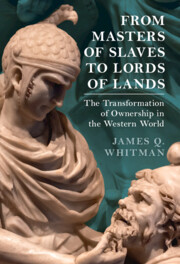Book contents
- From Masters of Slaves to Lords of Lands
- Studies in Legal History
- From Masters of Slaves to Lords of Lands
- Copyright page
- Dedication
- Contents
- Acknowledgments
- Introduction: Owning Humans, Owning Land – Two Primitive Modes of the Property Imagination
- Part I Masters of Men and Beasts
- 1 Hierarchy and the Hunt for Prey: Early Human Ownership
- 2 Masters of Men and Beasts: The Early Roman Fantasia of Ownership
- 3 The Dominus Enters the Law
- 4 Classical Roman Slave Law: The Just Hunt for Human Prey
- 5 An Empire of the Chieftainship over People
- Part II From Masters to Lords
- Conclusion: From Man the Killer to Man the Tiller
- Bibliography
- Index
- Studies in Legal History
5 - An Empire of the Chieftainship over People
from Part I - Masters of Men and Beasts
Published online by Cambridge University Press: 28 November 2024
- From Masters of Slaves to Lords of Lands
- Studies in Legal History
- From Masters of Slaves to Lords of Lands
- Copyright page
- Dedication
- Contents
- Acknowledgments
- Introduction: Owning Humans, Owning Land – Two Primitive Modes of the Property Imagination
- Part I Masters of Men and Beasts
- 1 Hierarchy and the Hunt for Prey: Early Human Ownership
- 2 Masters of Men and Beasts: The Early Roman Fantasia of Ownership
- 3 The Dominus Enters the Law
- 4 Classical Roman Slave Law: The Just Hunt for Human Prey
- 5 An Empire of the Chieftainship over People
- Part II From Masters to Lords
- Conclusion: From Man the Killer to Man the Tiller
- Bibliography
- Index
- Studies in Legal History
Summary
This chapter addresses the nature of Roman imperial rule. Roman historians have often argued that rulership in the Roman Empire was modeled on the household powers of the Roman paterfamilias. In particular, as Myles Lavan and other recent scholars have suggested, Roman rule made heavy use of the ideology of the master/slave relationship; the idiom of power of Roman rulership, on this account, turned on the rhetoric of enslaving the peoples of the world. The chapter surveys these interpretations, with the purpose of highlighting the conceptual connections between Roman ownership and Roman rulership. Just as the modern territorial state is conceptualized in ways that are in close harmony with the modern private ownership of land, the classical Roman understanding of rule was in harmony with the Roman understanding of household domination.
- Type
- Chapter
- Information
- From Masters of Slaves to Lords of LandsThe Transformation of Ownership in the Western World, pp. 208 - 228Publisher: Cambridge University PressPrint publication year: 2025

